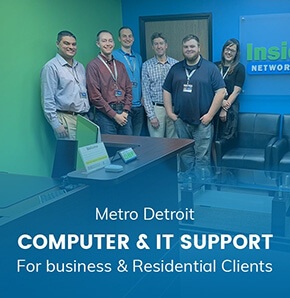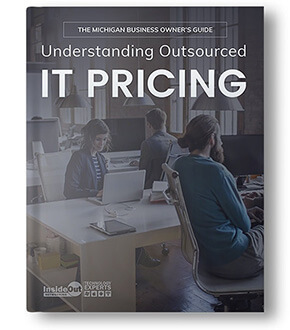
Factors That Impact Monthly Rates for IT Services
The fee charged by providers of managed IT services depends on several factors. Their rates vary depending on the complications of the IT environment, the number of users and devices, and the level of IT support needed by businesses.
Key Aspects Influencing the Rates of MSPs
Here are the factors that affect a Managed Services Provider’s (MSP) charges.
1. The Technical Complication of the Network
A business’s IT network consists of a plethora of technological devices and software. MSPs price their services based on the effort needed to maintain them. The larger the number of devices and software that require maintenance, the higher will be the workload and pricing of the MSPs. A business usually needs to maintain the following:
- Laptops
- Smartphones
- Tablets
- Servers
- Software
- Network
- Wi-Fi
- Desktops / Workstations
- PCs & Macs
- Spam filtering
- Antivirus
- Personal devices
- Cloud Applications
- Vendor Management
2. The Age of the Technology in Question
A good MSP will always want to keep businesses updated with the latest technologies. Therefore, an MSP considers the current overall age of the business’s IT system to determine their fee. Organizations with aging technology require more attention and maintenance and are, therefore, charged more. Businesses with newer technologies are charged less because of their low maintenance requirement
3. Number of Users Being Monitored
MSPs consider the number of users that require managed IT services. MSPs also cover support for all devices used by each user.
The first step in offering per-user pricing is deciding the entire cost or responsibility of an MSP. The final price is reached by ranking a variety of core aspects, which include but aren’t limited to:
- Employees’ Computer Literacy
MSPs analyze each employee’s technical competency to understand the level of technical resources and help desk support they will require. While computer-savvy users will require less support, others may require more. The overall analysis determines the price an MSP will charge for providing managed IT services.
- Ease of Working with a Business
Businesses that are receptive to an MSP’s recommendations and want to avail of their services and the latest technologies are charged lesser than those that aren’t. In the case of the latter, initiatives take longer to implement. Hence, the charges increase.
4. Number of Devices Used by Businesses
MSPs also price their services based on the type of device, such as server, mobile device, and desktop, which is to be managed by them. Organizations are required to pay a flat fee for each device supported by an MSP. For instance, MSPs may charge businesses a flat fee of $100-400 per server, $50-150 per laptop, $10-60 per printer, $20-80 per firewall set up, and so on.
The pricing calculated on a per-device basis is flexible. As a business expands, devices can be added and removed as and when required.
5. Salary of the Outsourced IT Staff
MSPs hire exceptionally talented IT staff for giving their clients a world-class IT experience. In fact, hiring them is no less than an investment for an MSP. MSPs recruit, train, and provide an optimum monthly salary to their staff.
Therefore, the salary of the IT staff is a critical factor that affects the pricing of MSPs.
6. Cost of Selling IT Services
The pricing of managed IT services also depends on the cost of marketing and advertising their services. MSPs need to work with renowned marketing partners, who can help them market their services and lead to their growth. Their pricing, therefore, includes costs incurred for travel and business meetings conducted during the course of the marketing and advertising initiatives.
7. The Need for Advanced Security
Companies need strong measures to secure their network, systems, and confidential data from cyber-attackers. This factor also influences the rates of IT services providers. MSPs offer security services such as:
- Remote Monitoring Management (RMM)
MSPs use RMM to remotely supervise and control IT systems such as desktop and servers. It also enables MSPs to incorporate patches and updates, install and configure software, and solve IT issues remotely.
- Multi-Factor Authentication (MFA)
MSPs streamline and secure the user experiences with the help of Multi-Factor Authentication. This technology requires an additional authentication factor, which makes it difficult for hackers to access a business’s systems. This authenticating information can include a unique one-time password sent on their registered email or phone number. It can also consist of biometric factors such as iris scan and fingerprint recognition.
- Network Access Restriction
MSPs limit an employee’s access rights solely to the data that he/she needs to perform his/her job. They also regularly audit these permissions to prevent malicious insiders from leaking confidential business data.
- Endpoint Security
MSPs use web filtering tools such as antivirus software to ensure that every endpoint is protected from cyber-attacks.
MSPs use web filtering tools such as antivirus software to ensure that every endpoint is protected from cyber-attacks.
- Employee Cybersecurity Training
MSPs provide extensive cybersecurity training to employees by educating them on how to detect and avoid cyber-attacks.
8. Regulatory Requirements and Industry Standards
Industries such as healthcare, financial services, and legal services that are governed by specific compliance regulations such as HIPAA, PCI DSS, and GDPR have additional IT needs. These types of organizations require extensive security and compliance regulations, adhering to which requires more time and expertise from an MSP. MSPs, therefore, price their services in accordance with compliance requirements.
MSPs provide locally outsourced IT support to help businesses stay in line with local regulatory compliance. For instance, businesses in Detroit can leverage managed IT services in Detroit to adhere to their state-specific compliance laws.
Wrap Up
A reliable MSP is transparent about how much its services cost and the IT areas it will cover under their stated fees. Several factors can influence their rates. From compliance management and cybersecurity measures to the number of users and devices being monitored, a good MSP works closely with organizations and delivers the best-priced solutions.

I’m Dave Goodenough. I started InsideOut Networking in 2004 with the idea that if we could cut through all the jargon and tech speak and just have real conversations about computers and technology, we could help a lot of people out and develop long-term relationships with our clients.
Today, we have over 2,500 clients who trust us to make sure their computers are always up to date and protected from security threats, allowing them to do exactly what they need. If you’d like to find out if we can help your business, please contact us today.



